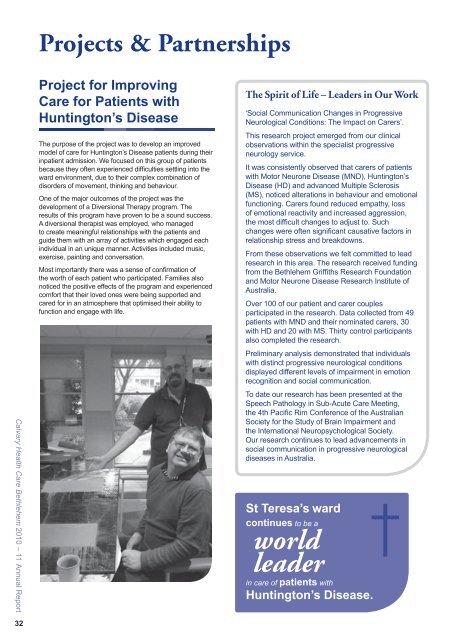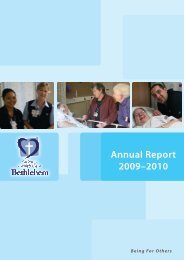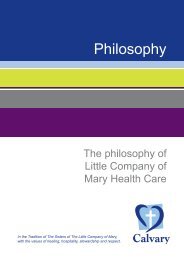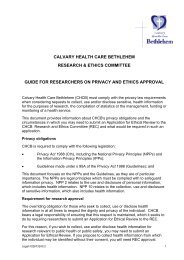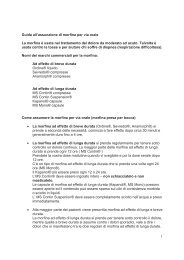Annual Report 2011 - Calvary Health Care Bethlehem
Annual Report 2011 - Calvary Health Care Bethlehem
Annual Report 2011 - Calvary Health Care Bethlehem
Create successful ePaper yourself
Turn your PDF publications into a flip-book with our unique Google optimized e-Paper software.
<strong>Calvary</strong> <strong>Health</strong> <strong>Care</strong> <strong>Bethlehem</strong> 2010 – 11 <strong>Annual</strong> <strong>Report</strong> 32<br />
Projects & Partnerships<br />
Project for Improving<br />
<strong>Care</strong> for Patients with<br />
Huntington’s Disease<br />
The purpose of the project was to develop an improved<br />
model of care for Huntington’s Disease patients during their<br />
inpatient admission. We focused on this group of patients<br />
because they often experienced difficulties settling into the<br />
ward environment, due to their complex combination of<br />
disorders of movement, thinking and behaviour.<br />
One of the major outcomes of the project was the<br />
development of a Diversional Therapy program. The<br />
results of this program have proven to be a sound success.<br />
A diversional therapist was employed, who managed<br />
to create meaningful relationships with the patients and<br />
guide them with an array of activities which engaged each<br />
individual in an unique manner. Activities included music,<br />
exercise, painting and conversation.<br />
Most importantly there was a sense of confirmation of<br />
the worth of each patient who participated. Families also<br />
noticed the positive effects of the program and experienced<br />
comfort that their loved ones were being supported and<br />
cared for in an atmosphere that optimised their ability to<br />
function and engage with life.<br />
The Spirit of Life – Leaders in Our Work<br />
‘Social Communication Changes in Progressive<br />
Neurological Conditions: The Impact on <strong>Care</strong>rs’.<br />
This research project emerged from our clinical<br />
observations within the specialist progressive<br />
neurology service.<br />
It was consistently observed that carers of patients<br />
with Motor Neurone Disease (MND), Huntington’s<br />
Disease (HD) and advanced Multiple Sclerosis<br />
(MS), noticed alterations in behaviour and emotional<br />
functioning. <strong>Care</strong>rs found reduced empathy, loss<br />
of emotional reactivity and increased aggression,<br />
the most difficult changes to adjust to. Such<br />
changes were often significant causative factors in<br />
relationship stress and breakdowns.<br />
From these observations we felt committed to lead<br />
research in this area. The research received funding<br />
from the <strong>Bethlehem</strong> Griffiths Research Foundation<br />
and Motor Neurone Disease Research Institute of<br />
Australia.<br />
Over 100 of our patient and carer couples<br />
participated in the research. Data collected from 49<br />
patients with MND and their nominated carers, 30<br />
with HD and 20 with MS. Thirty control participants<br />
also completed the research.<br />
Preliminary analysis demonstrated that individuals<br />
with distinct progressive neurological conditions<br />
displayed different levels of impairment in emotion<br />
recognition and social communication.<br />
To date our research has been presented at the<br />
Speech Pathology in Sub-Acute <strong>Care</strong> Meeting,<br />
the 4th Pacific Rim Conference of the Australian<br />
Society for the Study of Brain Impairment and<br />
the International Neuropsychological Society.<br />
Our research continues to lead advancements in<br />
social communication in progressive neurological<br />
diseases in Australia.<br />
St Teresa’s ward<br />
continues to be a<br />
world<br />
leader<br />
in care of patients with<br />
Huntington’s Disease.


